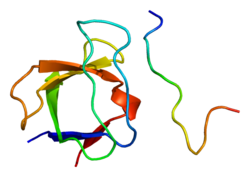Proto-oncogene tyrosine-protein kinase Fyn (p59-FYN, Slk, Syn, MGC45350, Gene ID 2534)[5] is an enzyme that in humans is encoded by the FYN gene.[6]
Fyn is a 59-kDa member of the Src family of kinases typically associated with T-cell and neuronal signaling in development and normal cell physiology. Disruptions in these signaling pathways often have implications in the formation of a variety of cancers. By definition as a proto-oncogene, Fyn codes for proteins that help regulate cell growth. Changes in its DNA sequence transform it into an oncogene that leads to the formation of a different protein with implications for normal cell regulation.[5][7]
Fyn is a member of the protein-tyrosine kinase oncogene family. It encodes a membrane-associated tyrosine kinase that has been implicated in the control of cell growth. The protein associates with the p85 subunit of phosphatidylinositol 3-kinase and interacts with the fyn-binding protein. Alternatively spliced transcript variants encoding distinct isoforms exist.[8]
- ^ a b c GRCh38: Ensembl release 89: ENSG00000010810 – Ensembl, May 2017
- ^ a b c GRCm38: Ensembl release 89: ENSMUSG00000019843 – Ensembl, May 2017
- ^ "Human PubMed Reference:". National Center for Biotechnology Information, U.S. National Library of Medicine.
- ^ "Mouse PubMed Reference:". National Center for Biotechnology Information, U.S. National Library of Medicine.
- ^ a b Saito YD, Jensen AR, Salgia R, Posadas EM (2010-04-01). "Fyn". Cancer. 116 (7): 1629–1637. doi:10.1002/cncr.24879. ISSN 1097-0142. PMC 2847065. PMID 20151426.
- ^ Semba K, Nishizawa M, Miyajima N, Yoshida MC, Sukegawa J, Yamanashi Y, et al. (August 1986). "yes-related protooncogene, syn, belongs to the protein-tyrosine kinase family". Proceedings of the National Academy of Sciences of the United States of America. 83 (15): 5459–63. Bibcode:1986PNAS...83.5459S. doi:10.1073/pnas.83.15.5459. PMC 386306. PMID 3526330.
- ^ Posadas EM, Al-Ahmadie H, Robinson VL, Jagadeeswaran R, Otto K, Kasza KE, et al. (2009-01-01). "FYN is overexpressed in human prostate cancer". BJU International. 103 (2): 171–177. doi:10.1111/j.1464-410X.2008.08009.x. ISSN 1464-410X. PMC 2741693. PMID 18990162.
- ^ "Entrez Gene: FYN FYN oncogene related to SRC, FGR, YES".







